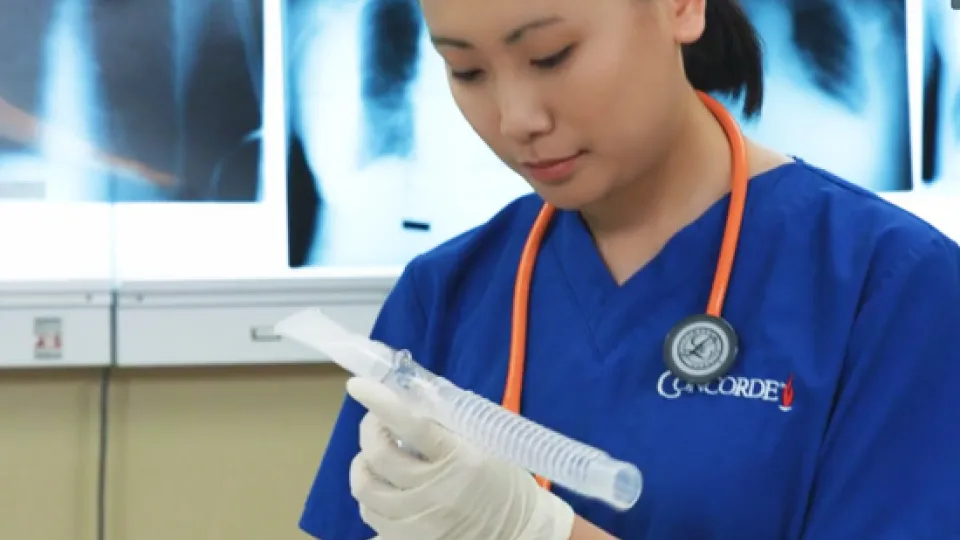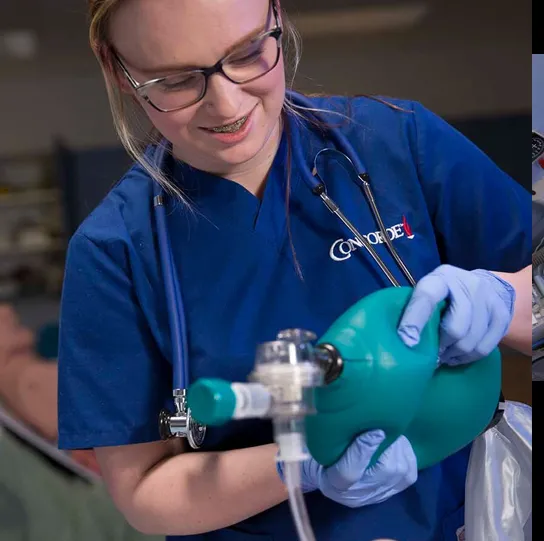
Working in health care can offer many benefits, such as fulfilling duties and opportunities to help others. As there are many jobs to pursue when choosing a career in health care, it can be helpful to learn more about what different specialists do, as this can help you decide which career aligns with your skills, preferences, and professional goals. Two common careers in health care are a respiratory therapist (RT) and a registered nurse (RN). While these jobs can have similar goals, they differ in a few ways, which we'll explore below.
Respiratory Therapist

According to the BLS Occupational Outlook Handbook for respiratory therapists , these health care professionals look after patients who have trouble breathing, including those who suffer from a chronic respiratory disease, such as asthma or emphysema. Their patients can range in age from premature infants with undeveloped lungs to elderly patients who have health conditions related to aging. Common job duties for RTs include assessing patients, teaching them effective breathing techniques, and administering medical gases, such as oxygen.
RTs can also provide emergency care to patients suffering from heart attacks, drowning, or shock. They may perform diagnostic tests to evaluate lung function or test oxygen levels in the blood, administer inhaled medications, and apply or manage ventilators for patients who cannot breathe on their own.
Related: Should You Study Respiratory Therapy? Career Outlook Guide
Interested In How To Become a Respiratory Therapist?
Click here to explore Respiratory Therapy Programs near you!
RTs must be licensed in all states, except Alaska, but the licensing requirements vary from state to state. Certification is required in order to obtain state licensure, and it is available from the National Board for Respiratory Care, and employers may be more drawn to hire certified RTs.
Related: Prerequisites For Respiratory Therapy Programs
Registered Nurse

The United States Bureau of Labor Statistics Occupational Outlook Handbook shows that RNs provide and coordinate patient care, educate patients and the public about various health conditions, and provide advice and emotional support to patients and their families. Most RNs work as part of a team with physicians and other health care specialists, and some oversee licensed practical nurses, nursing assistants, or home health aides.
RNs can have an array of responsibilities, such as assessing a patient's condition, administering medicines and treatments, and helping perform diagnostic tests and analyze the results. Another key part of the work of an RN is developing patient care plans that keep records of patient progress. Some nurses don't work directly with patients, but they still maintain an active RN license.
Related: Is Nursing Right For You?
Educational Requirements for RT and RN roles
To become an RT, you'll need to get at least an associate degree, but it is possible to continue on to a bachelor's degree. Typical courses include anatomy, physiology, chemistry, physics, and microbiology, as well as supervised clinical experiences. RNs study the same subjects; however, their focus is different because RNs must care for the whole patient.
Interested In Training To Become an RN?
Click here to explore Concorde's Nursing Pre-Licensure programs near you!
Nurses have multiple options for their basic education, which includes an associate degree or a bachelor's degree. RNs may also obtain additional education and become advanced practice nurses, which involves a broad scope of practice.
Related: The Importance of Work-Life Balance When Working in Nursing
Work Setting Differences
RNs mostly work in hospitals, but they have the option to work in physicians' offices, home health, nursing care facilities, correctional facilities, and schools. Depending on where they work, their hours and shifts may vary. For instance, many RNs work on-call hours that involve remaining available to go into work in case of an emergency. While on-call hours can sometimes result in not being called in, RNs still have to stay ready to work in case they're needed.
Although most RTs work in hospitals, they also have the ability to work in outpatient care centers, nursing care facilities, or in-home care. In hospitals, RTs may need to work evening or night shifts, weekends, and holidays. While some respiratory therapists have on-call hours, these are typically for those who work in emergency services or an advanced-level role.
Choosing Between a Career as an RT or RN
As these careers can differ in a variety of ways, it can be helpful to consider some specific aspects of each job before deciding which is right for you. For example, think about your professional goals and personal preferences for work environment and hours, as a candidate who's more interested in specializing in a particular area of the medical field may prefer to work as an RN, which offers more variety in terms of specialization.
You can also assess your skills, as you may have specific abilities that can help you succeed in one of these roles. For instance, if you're particularly talented at operating machines and paying close attention to detail, you may thrive as an RT.
Are you ready to prepare for your journey as an RT or RN? Contact us for more information about what you can do.
"Respiratory Therapists," United States Bureau of Labor Statistics Occupational Outlook Handbook, https://www.bls.gov/ooh/healthcare/respiratory-therapists.htm
"Registered Nurses," United States Bureau of Labor Statistics Occupational Outlook Handbook, https://www.bls.gov/ooh/healthcare/registered-nurses.htm#tab-1
Take The Next Step Towards a Brighter Future
Interested in learning more about our Respiratory Therapy program?
We have a Concorde representative ready to talk about what matters most to you. Get answers about start dates, curriculum, financial aid, scholarships and more!








